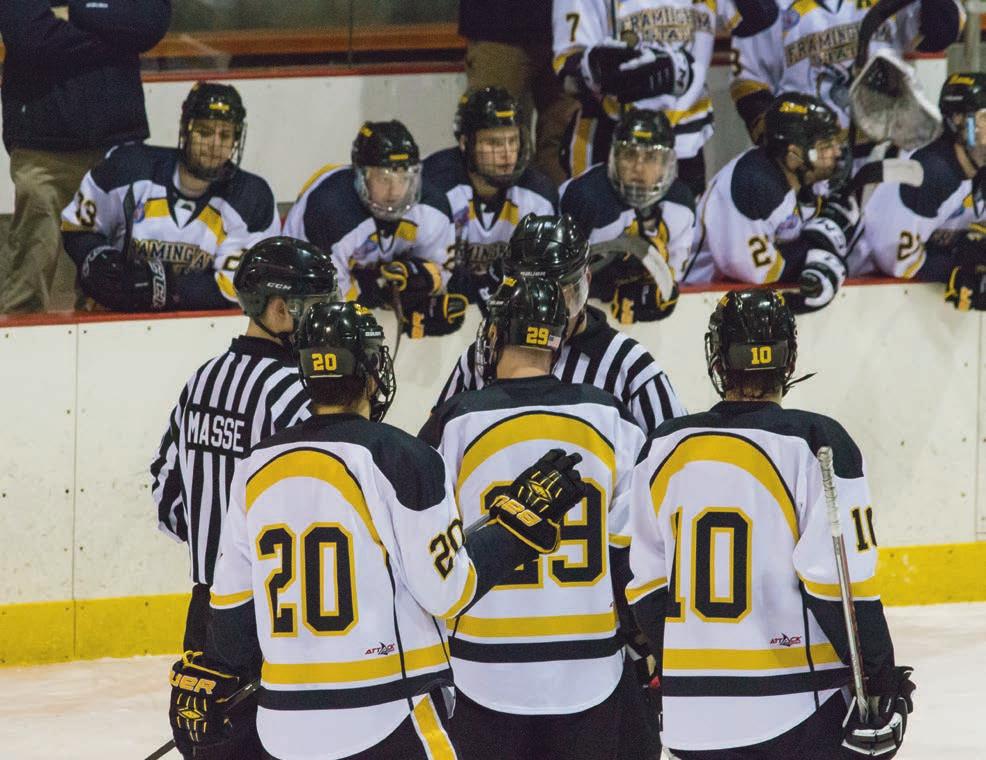
8 minute read
HOCKEY
from February 12, 2021
by The Gatepost
SPORTS
FS hoc ey team on ause due to C D 1
By Danielle Achin
Sports Editor
Winter is a time to be on the ice and enjoy the cold weather. However, the season didn’t exactly turn out as expected for the Framingham State ice hockey team.
Seniors Nolan Greene and Matthew Siegel were disappointed their time skating together was cut short despite having an optimistic outlook on their season.
“We started captains’ practices about a couple weeks into school, which we paid for [ourselves], and that had been going on for about a month,” Siegel said. “We thought not hearing anything from the school was a positive, until we found out through social media the league canceled the season.” hey found it difficult to belie e their season was canceled via Twitter.
“ t was retty much the nail in the coffin,” Siegel said. “It really did happen - we were just really into it this season and we never got the opportunity as a senior class.”
Greene said, “A lot of people weren’t really happy with that. Despite being cautious with everything.”
Siegel came to FSU from Syracuse, New York and has been on the ice since he was 2 years old. He got involved in the youth hockey league when he was 4.
“My mom’s father started a hockey shop business in Syracuse, so it’s always kinda been a big part of our lives,” said Siegel.
He finished his 1 season with 5 assists, and scored 5 goals total.
Greene is from Quincy and had been skating since he was about 4 and began playing hockey around the third grade.
“I played other sports but I wasn’t very good,” Greene said. “My main focus was hockey and everything else was just for fun.”
The two men and other seniors made it a point of turning the team around for better seasons to come and were upset they wouldn’t be able to witness the progress on the ice, but proud of the commitment the team had made to each other.
Greene said, “By last year, team stretches and workouts became mandatory. You had to eat right and we tried to make everyone feel welcome. The whole culture was different.
“I think that’s something that will carry on with the grades below us,” he added. reene finished last year’s season with a goals against a erage of . , and 1 sa es o erall.
Without funds from the school, the team is unable to schedule any ice time for ractices ma ing it difficult to see each other.
“There’s a locker room bond that’s not like any other sport in my opinion,” said Siegel. “There’s probably a minimum of a 3 minute window before or after ractice where everyone is in the same room and we’re just vibing, and that’s where you really form a brotherhood.
“This year we didn’t have that - we had to get dressed outside,” he added.
Greene said, “You miss the games, but you miss the locker room more than anything, everyone is just laughing and having a good time. No one is really on their phones.”
He added, “ hat’s definitely what miss the most.”
Finding out last year’s season would also be their final one, the men leave some words of encouragement for the grades below and future members.
“Enjoy your four years and cherish your time playing and being with the boys,” Siegel said.
“People always say it. I always thought it was a clichè, ‘You never know when your last game is gonna be.’ Well, I actually had my last game and I didnt even know it.”
Greene added, “Every moment, just enjoy it. Obviously there are gonna be times when it sucks but not in the locker room when you’re just dying laughing.”
courtesy of fsurams

Matthew Siegal | courtesy of fsurams
Nolan Grenne | courtesy of fsurams
ARTS & FEATURES
Porsha Olayiwola
Continued from page 1
Olayiwola said the poem is “grounding” for her.
The poem includes examples of activities Olayiwola, her brother, and her father would have done had he not been deported such as watching movies starring Eddie Murphy, pitching tents, and riding bikes.
“We might all be sitting about the pink kitchen table with the white legs / my father, a taxi driver, might have come home late in the evening with two large chuck steaks bloodied, red, fresh, best he could bring / he might have seasoned the meat, his thick brown hands gently letting loose salt how god did earth / he might lay a sheet of cayenne o er the flesh a homeland con uered by sun, a fire gouged between cheeks, eyes watering a flag of surrender my father might have survived the night to serve us,” Olayiwola said.
She also touched upon the potential of her parents’ relationship had her father not been deported.
In the poem, Olayiwola provided descriptive imagery of her father jokingly wearing her mother’s dress and the family laughing about it.
The poem closed with the lines, “And my father, a man who gave like a tree, might ha e lined his fingers over my mother’s tombed heart, and swayed his hips to his cadence.”
Olayiwola discussed a manuscript she is working on that connects Black diaspora, queer sex, and water.
She said she visited her father in Lagos, Nigeria three years ago, the first time in 20 years.
Olayiwola said she asked her father to take her to a slave port, two hours from Lagos, Nigeria, which used to take slaves from Nigeria to Brazil.
She shared her experience on a tour to the slave port.
Olayiwola said the tour guide told the group the colonizers had “rootwor ers and medicine fol s” fix the water, so slaves would suffer from short-term memory loss, unable to find their way home.
She said there was a well people still do not drink from due to superstitions.
“It blew me away,” she added.
She wrote a poem titled “We Drink at the Attenuation Well,” detailing her experience at the slave port. layiwola ersonified the well within the first few lines, “ n adgary there is a hungry well of water and memory loss.”
The poem touches upon violence and how the water from the well makes people forget the violence.
She read the closing lines of the poem which offered hope for those who lost their memories.
“In Badagry there is a heaven of people responsible for the birthright of remembering, for the well of us across a haven of water overwhelmed in un-return.”
Olayiwola shared two poems yet to be released.
She said both poems connect to her water poem. These two poems concern the black diaspora and queer intimacy.
Olayiwola said she was especially excited to share her poem on queer intimacy titled, “Bring Me the Body.”
She said the poem was called a “contrapuntal,” meaning she can read the poem three ways. It is written in two columns with one column going across the other two.
Olayiwola shared a personal anecdote on how she got the inspiration for the poem.
She said she was in the kitchen, making a sandwich, while her partner wanted to be intimate.
Olayiwola said at that moment she had to choose between “two necessary human needs.
“I conceptualized the poem right then and there,” she said. Olayiwola described the poem as being about “fatness, queer intimacy, and desire.”
She shared her next poem, “The Cops Behind Us.” he oem consisted of s ecific frican American characters who she described as, “thick as thieves” who decided to go for “a joy ride.”
Police officers were mentioned in the poem, speaking to the police brutality against Black Americans.
Olayiwola shared another poem about her mother titled, “My Mother.”
“I used to start out every public performance with this poem because it makes me feel grounded. What a better way to start off a performance than talking about my mom?” she said.
Olayiwola said she is blessed to have a mother who is willing to grow with her. n the first lines, she described her mother as a “runaway slave, along the shore.”
The poem included her mother’s history of living in Mississippi and Chicago and her financial troubles while earning her associate’s degree in childhood education.
In the poem, Olayiwola described her mother as “the difference between ghetto and hood” and as a Christian who does not stay at church to sing because of the “shadiness going on behind the scenes.”
She said she got a commission from Netflix to write about what it meant to be a Black, queer woman right now. he oem is called, “Netflix Calls to Ask What Pride Looks Like for a Black, Queer Woman.”
Olayiwola discussed the LGBTQIA+ flag in the oem.
“Science tells us about the rainbow, if you mix all the colors refracting light, the result is pure white, a pearly milk,” she said.
Olayiwola touched upon the irony of how the colors blend together to create the color of white supremacy.
The poem also includes the color black and how science has proved it was present before the other colors.
She described pride to a Black, queer woman as a parody refusing to join the fight against olice brutality.
Olayiwola then discussed Afrofuturism.
She defined frofuturism as, “art, music, thoughts, and an idea that Black folks already live a life at the intersection of sci fi and naming and owning Black stories. Afrofuturism uses magical realism and sci fi. nd, intertwining the history of the past, present, and future.”
Olayiwola closed by talking about her thoughts as a poet and how she started her career in poetry.
She said she thinks writers feel insecure about the work and said she gets outside of herself and thinks about the weight of certain things. But, ultimately, feels joy from her poetry.
Olayiwola said in high school, she had a mentor who brought her to a poetry slam. She said she left feeling “open” after a certain poem stood out to her.
“I was amazed. At that moment, the whole world stopped. I went home and wrote poems after that.”







